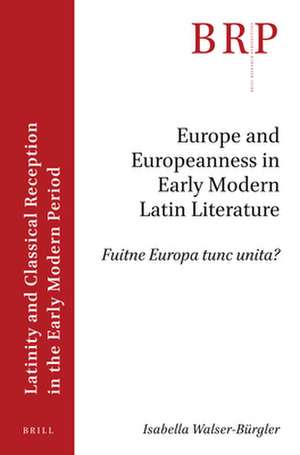Europe and Europeanness in Early Modern Latin Literature: Fuitne Europa tunc unita?: Brill Research Perspectives in Humanities and Social Sciences / Brill Research Perspectives in Latinity and Classical Reception in the Early Modern Period
Autor Isabella Walser-Bürgleren Limba Engleză Paperback – 10 feb 2021
Preț: 440.25 lei
Preț vechi: 517.94 lei
-15% Nou
Puncte Express: 660
Preț estimativ în valută:
84.24€ • 87.39$ • 70.25£
84.24€ • 87.39$ • 70.25£
Carte indisponibilă temporar
Doresc să fiu notificat când acest titlu va fi disponibil:
Se trimite...
Preluare comenzi: 021 569.72.76
Specificații
ISBN-13: 9789004459540
ISBN-10: 9004459545
Dimensiuni: 155 x 235 mm
Greutate: 0 kg
Editura: Brill
Colecția Brill
Seria Brill Research Perspectives in Humanities and Social Sciences / Brill Research Perspectives in Latinity and Classical Reception in the Early Modern Period
ISBN-10: 9004459545
Dimensiuni: 155 x 235 mm
Greutate: 0 kg
Editura: Brill
Colecția Brill
Seria Brill Research Perspectives in Humanities and Social Sciences / Brill Research Perspectives in Latinity and Classical Reception in the Early Modern Period
Notă biografică
Isabella Walser-Bürgler, Ph.D. (2014), is Key Researcher at the Ludwig Boltzmann Institute for Neo-Latin Studies in Innsbruck (Austria). She has published monographs, editions, translations, and articles on the Neo-Latin novel, the early modern discourse of Europe, and early modern Latin university orations.
Recenzii
"Isabella Walser-Bürgler’s book aims to demonstrate the genesis and development of an important discourse, the history of European integration, that Neo-Latin sources can elucidate in a much deeper way than only the use of vernacular sources can do. She provides a smörgåsbord of titles and quotations that undoubtedly will serve this purpose very well and makes us understand that a rich source material awaits those who immerse themselves in the treasuries of libraries and archives. The possibilities for new understanding not only for the past but also for topics that engage us directly today are legion."
Arne Jönsson in BMCR 22.06.44
Arne Jönsson in BMCR 22.06.44
Cuprins
Editorial Note
Abstract
Keywords
1 Introduction
2 Early Modern Latin: A European Language and a Language for ‘Europe’
3 Antecedents of the Early Modern Discourse of Europe
4 From Zero to Hero: Conceptualisations of Europe in the Early Modern Period
5 Perspectives
References
Abstract
Keywords
1 Introduction
2 Early Modern Latin: A European Language and a Language for ‘Europe’
3 Antecedents of the Early Modern Discourse of Europe
4 From Zero to Hero: Conceptualisations of Europe in the Early Modern Period
5 Perspectives
References




